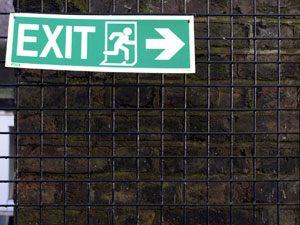
EVERYONE KNOWS the old adage, “You can choose your friends but you can’t choose your family”.
The New Testament describes us as being like family. So where is the love when people choose to leave?
Faith family break-up isn’t easy to talk about.
Yet a significant proportion of members leave our congregations each year, slipping out the back door, often unnoticed, while congregations invest their energy in welcoming anyone arriving at the front.
Recent National Church Life Survey figures indicate 10 per cent of the Uniting Church members leaving the denomination over a five year period switch to another denomination. Another seven per cent drift away from the church altogether.
With the oldest age profile of any Protestant denomination in Australia, the Uniting Church has been through a difficult period in the past decade.
At its lowest point, the National Church Life Survey recorded a 12 per cent decline, including mortality, in the period leading up to the 2001 survey.
That’s a steady proportion of people looking for the exit sign and may well reflect on congregations that don’t see the signs of our brothers and sisters heading for the door.
Canadian writer Gordon Turner interviewed those he called “church dropouts” in Canada, Australia, the UK and the USA.
In his book Outside Looking In, Mr Turner uncovered five basic reasons why even long-term members leave churches.
They were: inadequate ministry in crisis times, church not meeting personal needs, changes in lifestyle, conflict with the pastor or a church member, and a crisis of faith.
Loving people as they leave is not about manipulating them to change their mind, according to Rev Brian Hoole of Hervey Bay Uniting Church.
“Some who leave may, or may not, come back to our fellowship,” said Mr Hoole. “But I would rather they went somewhere and remained within the church. The door is always open of course.”
He says one part of that complex equation is having local ecumenical confidence, allowing a church to recommend another fellowship for those who feel they must leave.
Few church leavers formalise their departure with a letter to the church council.
Many congregations just don’t talk about it. They hope whatever the problem, it will fade away and be forgotten.
Some find fault, assuming the majority must be right and those leaving are wrong.
Others genuinely try to bless leavers as they go, in the hope that faith will grow as they find fellowship elsewhere.
Psychologist Coral Palmer left a congregation to which her family had belonged for four generations to explore a wider experience of church.
Ms Palmer has counselled many clients about the impact of leaving a congregation.
She said people who leave a church have generally agonised over the decision for a long time.
Congregational leaders face the significant challenge of noticing the early glances at the exit sign and trying to understand the reasons behind a departure.
“They are less likely to be understood if they have grown up in the church and have family members still there,” she said.
“There can be a lot of grief in leaving and also a sense of freedom if the person has felt constricted by the church’s approach.”
She said former members are often uncertain about staying in touch with friends they no longer see at Sunday services.
Podcaster at TheGodJourney.com Brad Cummings says Jesus’ claim to the title of The Good Shepherd, indicates his right to lead his sheep on a different path or somewhere else.
“There’s a sad tendency for church leaders to take someone’s departure personally,” said Mr Cummings.
“It leaves both parties hurting, the relationship broken, and fails to completely recognise the larger … body of Christ.
“There are some healthy, but rare, environments that recognise people’s time may be just for a season as they move on in their journey.
“They seek to love, invest in, care for, and then celebrate God’s direction in leading someone on,” he said.
In Uniting Church terms, in Queensland, that could be a big investment with enormous potential returns.
According to the Australian Bureau of Statistics 2006 census, more than 280,000 Queenslanders claim to be affiliated with the Uniting Church.
Fewer than 30,000 people regularly attend.
 JourneyOnline
JourneyOnline






